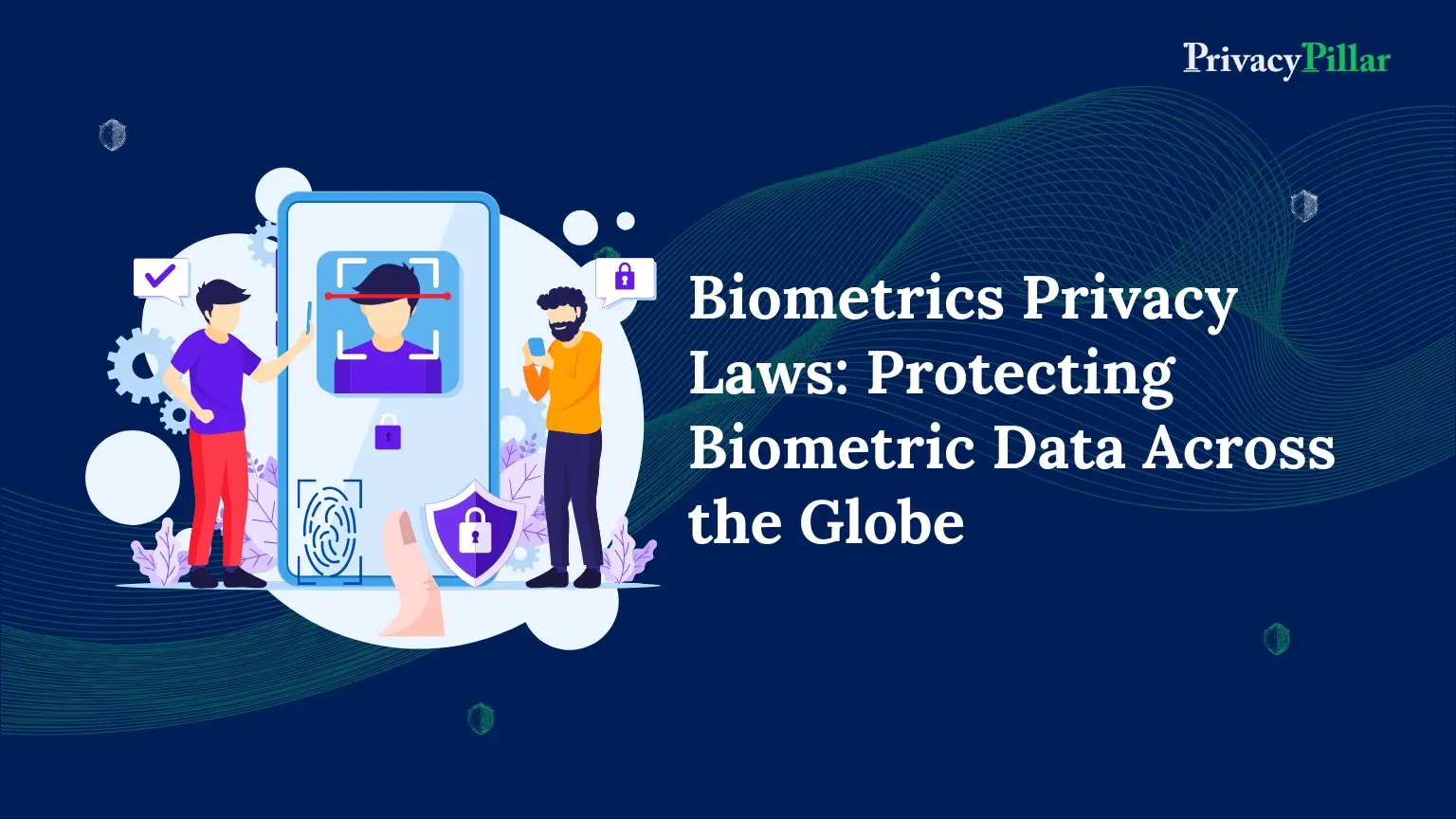
Biometrics Privacy Laws: Protecting Biometric Data Across the Globe
Nowadays biometrics play a vital role in improving security, customer experience, and helping in several processes across different industries. From facial recognition to unlocking your phone, fingerprints to enter restricted areas or iris scans giving you top level authentication, all our devices now have biometrics intertwined within! However, with this rise also comes an important question… How do we keep such a personal collection of biometric data private from any potential misuse?
What Are Biometrics and Why Are They Important?
Biometrics is a term used to describe physiological or behavioral characteristics of an individual which can be used for their unique identification, these include fingerprints, facial characteristics, voice and even the way they type. Such identifiers are used as a means of authentication and identification so that a particular resource stays accessible only to the authorized user.
However, because biometric data is permanent, once set, it cannot be reset like a password. This makes protecting biometric data crucial, especially as its use is expanding in industries like healthcare, finance, and workplaces. The potential for misuse of such data has led to the development of privacy laws aimed at regulating its collection, storage, and use.
Privacy Concerns Around Biometric Data
Despite the benefits of biometrics, there is a risk of misuse and abuse. The use of Facial Recognition technology in surveillance, workplace monitoring, and consumer products has raised concerns about privacy invasion and data breaches. Let us explore the key privacy concerns in more detail:
Irreversibility and Permanence
Biometric data, such as fingerprints, iris scans, and facial features, cannot be changed like passwords or PINs. If someone’s biometric data is stolen in a data breach, it can be exploited indefinitely. This poses a significant risk, as criminals could potentially use the stolen biometric information for malicious activities like identity theft, fraud, or impersonation.
Lack of Informed Consent and Transparency
A major privacy concern surrounding biometric data is the lack of informed consent. Many organizations collect and store biometric data without providing individuals with clear information about how their data is being used, how long it will be kept, or who will have access to it. Often, individuals are unaware that their biometric data is being collected through surveillance cameras, workplace monitoring systems or consumer products.
Additionally, the processing and sharing of biometric data with third parties, such as cloud providers or government agencies, are often done without explicit consent or transparency.
Biometric Data in the Workplace
The use of biometric data in the workplace, such as fingerprint scans or facial recognition for attendance or security systems, introduces complex privacy challenges. Employees often feel compelled to provide their biometric data, raising concerns for lack of genuine consent. Employers may also use biometric data for monitoring productivity, which can lead to surveillance concerns and issues of privacy intrusion.
Furthermore, employee’s biometric data can be shared with third-party vendors, further increasing the risk of data misuse or exposure. Without proper consent and transparency, employees may not be fully aware of how their biometric data is being stored and used.
Data Security Vulnerabilities
Despite being considered more secure than traditional methods like passwords, biometric data is still vulnerable to data breaches. As biometric data becomes more common in authentication systems, the security risks increase. Hacking or malware attacks targeting centralized databases storing biometric data can have profound consequences, including the permanent loss of sensitive information. In addition, biometric data can be replicated using advanced techniques such as deepfake technology or 3D printing to mimic facial features, fingerprints, or voice patterns. Once hackers obtain an individual’s biometric data, they can more easily bypass security systems compared to traditional password-based attacks.
Unregulated Use in Emerging Technologies
As biometric technology advances, new uses are constantly being developed, including AI-based biometric analysis and machine learning-driven surveillance systems. The absence of clear laws or guidelines governing the use of emerging biometric technologies can lead to their abuse and misuse, especially by companies and governments working in gray areas of privacy law.
For example, Voice recognition is widely used in smart devices and virtual assistants, but the collection and storage of voice data raise concerns about eavesdropping. Similarly, iris scanning, and fingerprint authentication offer convenience but expose individuals to privacy risks if not securely managed.
The Global Landscape of Biometric Privacy Laws
As the adoption of biometrics accelerates worldwide, countries are implementing robust privacy laws to ensure the protection of biometric data. Here’s a global overview of the major biometric privacy regulations:
General Data Protection Regulation (GDPR) – European Union
The GDPR, implemented in 2018, provides a broad framework for protecting biometric data within the European Union. As biometric data is classified as a special category of data, the regulation sets strict requirements on its collection and use.
- Lawful Basis for Processing: Biometric data cannot be processed without a lawful basis. Consent must be explicit and informed, particularly when used for finding individuals.
- Data Subject Rights: Individuals have strong rights under the GDPR, including the right to access, rectify, and erase their biometric data.
- Impact Assessments: Organizations processing biometric data must conduct Data Protection Impact Assessments (DPIAs) to evaluate the risks to individual’s privacy.
California Consumer Privacy Act (CCPA) – United States
The CCPA is one of the most comprehensive privacy laws in the U.S., extending protections to biometric data.
- Right to Know and Delete: Consumers have the right to access and request the deletion of their biometric data.
- Opt-Out Option: Consumers can opt out of the sale of their biometric data.
- Private Right of Action: Individuals can file lawsuits in case of a data breach involving their biometric information.
Biometric Information Privacy Act (BIPA) – Illinois, USA
The BIPA remains the standard for biometric privacy protection in the U.S. and has served as a model for other states.
- Written Consent: Businesses must obtain written consent before collecting or storing biometric data, including fingerprints, voice prints, facial recognition, or retinal scans.
- Retention and Destruction Policy: Companies must inform individuals about the length of time their biometric data will be stored and the specific date of its destruction.
- Private Right of Action: One of the unique aspects of BIPA is that it provides individuals with a private right of action to sue companies for violations, even without proof of harm.
Lei Geral de Proteção de Dados (LGPD) – Brazil
Brazil’s LGPD classifies biometric data as sensitive data. It introduces obligations around consent, transparency, and the rights of data subjects about the processing of biometric data.
- Explicit Consent: Companies must secure explicit consent before collecting biometric data unless an exception applies (such as in legal proceedings).
- Data Portability: Individuals have the right to transfer their biometric data from one provider to another, ensuring greater control over their information.
- Data Breach Notifications: In case of a biometric data breach, companies must inform both the National Data Protection Authority (ANPD) and affected individuals.
Protection of Personal Information Act (POPIA) – South Africa
South Africa’s POPIA offers GDPR-like protection and regulates the use of biometric data as part of its framework for the processing of personal information.
- Informed Consent: As with GDPR, companies must obtain informed consent before collecting or using biometric data.
- Processing Limitation: Organizations must ensure that only relevant and necessary biometric data is collected.
- Data Security: Companies must take proper technical measures to secure biometric data and ensure that it’s protected against breaches.
Personal Information Protection and Electronic Documents Act (PIPEDA) – Canada
- Canada’s PIPEDA governs the handling of personal information by private-sector organizations and places particular emphasis on biometric data.
- Consent Requirement: Organizations must obtain meaningful consent before collecting, using, or showing biometric data, and individuals must be informed about how their data will be used.
- Accountability: Companies are responsible for protecting biometric data and ensuring third-party processors adhere to the same standards.
- Transparency: Businesses must be transparent in their use of biometric data and provide individuals with access to their data when requested.
Digital Personal Data Protection (DPDP) Act – India
India’s DPDP Act, which is soon to be enforced, includes specific guidelines around biometric data, reflecting the country’s increasing reliance on biometric authentication for services like Aadhaar.
- Consent and Purpose Limitation: Explicit consent is needed, and biometric data must only be collected for specific, lawful purposes.
- Security Measures: Organizations must adopt adequate security measures to protect biometric data from unauthorized access.
- Cross-Border Transfers: Stricter rules are applied for transferring biometric data outside India.
The Future of Biometric Privacy
With the rise of AI and machine learning, biometric technologies will continue to evolve, and privacy laws will likely follow suit. Companies must stay informed of these changes and adopt solutions that ensure compliance while protecting the privacy of individuals.
Stay Ahead of Biometric Privacy Laws
As biometric data becomes more integrated into our daily lives, it’s essential for businesses to understand the regulations governing its use. Non-compliance can lead to hefty fines, reputation damage, and legal liabilities. By adopting privacy solutions like those provided by PrivacyPillar, companies can ensure they are protecting not only their customers but also their business from the risks associated with biometric data misuse.
Frequently Asked Questions (FAQs)
What is biometric data?
Biometric data refers to physical or behavioral characteristics unique to an individual, such as fingerprints, facial recognition, iris patterns, and voice recognition.
Why is biometric data considered sensitive?
Since biometrics are unique to each person and cannot be changed once compromised, biometric data poses higher risks compared to traditional passwords or PINs.
Which laws regulate biometric privacy?
Key regulations include the GDPR (Europe), CCPA (California), DPDP Act (India), PIPEDA (Canada), and others in emerging markets such as Brazil (LGPD) and South Africa (POPIA).
What is privacy in biometrics?
Privacy in biometrics involves ensuring that the collection, processing and storage of biometric data respects individual rights. It means that businesses must obtain informed consent, be transparent about how the data is used and implement proper security measures to protect against data breaches and misuse.
What are the security and privacy issues of biometrics?
Biometric systems are vulnerable to several security and privacy risks, including data breaches, identity theft and unauthorized surveillance. Hackers can steal biometric data, and because biometrics cannot be changed, individuals face a lifetime risk once compromised. Additionally, improper handling of biometric data can lead to violations of privacy rights.



